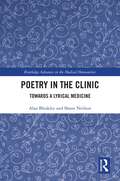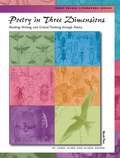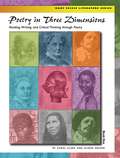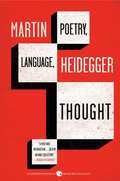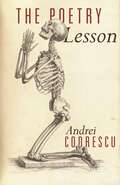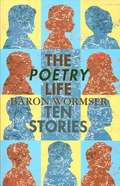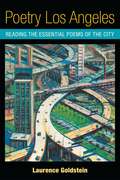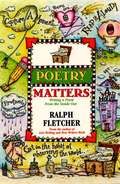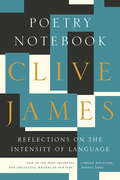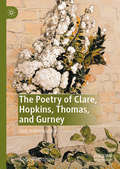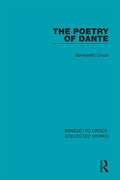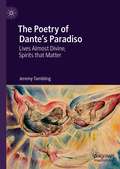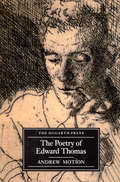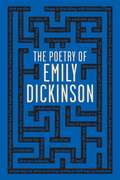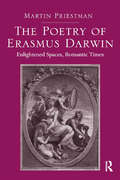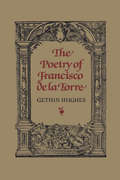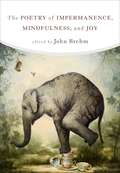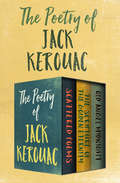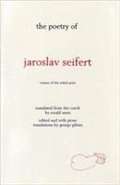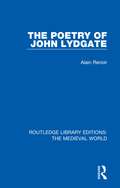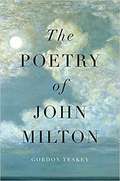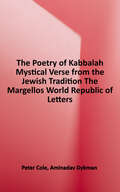- Table View
- List View
Poetry in the Clinic: Towards a Lyrical Medicine (Routledge Advances in the Medical Humanities)
by Alan Bleakley Shane NeilsonThis book explores previously unexamined overlaps between the poetic imagination and the medical mind. It shows how appreciation of poetry can help us to engage with medicine in more intense ways based on ‘de-familiarising’ old habits and bringing poetic forms of ‘close reading’ to the clinic. Bleakley and Neilson carry out an extensive critical examination of the well-established practices of narrative medicine to show that non-narrative, lyrical poetry does different kind of work, previously unexamined, such as place eclipsing time. They articulate a groundbreaking ‘lyrical medicine’ that promotes aesthetic, ethical and political practices as well as noting the often-concealed metaphor cache of biomedicine. Demonstrating that ambiguity is a key resource in both poetry and medicine, the authors anatomise poetic and medical practices as forms of extended and situated cognition, grounded in close readings of singular contexts. They illustrate structural correspondences between poetic diction and clinical thinking, such as use of sound and metaphor. This provocative examination of the meaningful overlap between poetic and clinical work is an essential read for researchers and practitioners interested in extending the reach of medical and health humanities, narrative medicine, medical education and English literature.
Poetry in Three Dimensions: Reading Writing and Critical Thinking Through Poetry (Book Two)
by Carol Clark Alison DraperThis book is a collection of works by Americans: African Americans, Asian Americans, European Americans, Hispanic Americans, and Native Americans.
Poetry in Three Dimensions: Reading Writing and Critical Thinking Through Poetry (Book One )
by Carol Clark Alison DraperThis book is a collection of works by Americans: African Americans, Asian Americans, European Americans, Hispanic Americans, and Native Americans.
Poetry, Language, Thought (Harper Perennial Modern Thought Ser.)
by Martin HeideggerPoetry, Language, Thought collects Martin Heidegger's pivotal writings on art, its role in human life and culture, and its relationship to thinking and truth. Essential reading for students and anyone interested in the great philosophers, this book opens up appreciation of Heidegger beyond the study of philosophy to the reaches of poetry and our fundamental relationship to the world. Featuring "The Origin of the Work of Art," a milestone in Heidegger's canon, this enduring volume provides potent, accessible entry to one of the most brilliant thinkers of modern times.
The Poetry Lesson
by Andrei CodrescuA rollicking story of the strangest creative writing class ever—as only Andrei Codrescu could tell it"Intro to Poetry Writing is always like this: a long labor, a breech birth, or, obversely, mining in the dark. You take healthy young Americans used to sunshine (aided sometimes by Xanax and Adderall), you blindfold them and lead them by the hand into a labyrinth made from bones. Then you tell them their assignment: 'Find the Grail. You have a New York minute to get it.' "—The Poetry LessonThe Poetry Lesson is a hilarious account of the first day of a creative writing course taught by a "typical fin-de-siècle salaried beatnik"—one with an antic imagination, an outsized personality and libido, and an endless store of entertaining literary anecdotes, reliable or otherwise. Neither a novel nor a memoir but mimicking aspects of each, The Poetry Lesson is pure Andrei Codrescu: irreverent, unconventional, brilliant, and always funny. Codrescu takes readers into the strange classroom and even stranger mind of a poet and English professor on the eve of retirement as he begins to teach his final semester of Intro to Poetry Writing. As he introduces his students to THE TOOLS OF POETRY (a list that includes a goatskin dream notebook, hypnosis, and cable TV) and THE TEN MUSES OF POETRY (mishearing, misunderstanding, mistranslating . . . ), and assigns each of them a tutelary "Ghost-Companion" poet, the teacher recalls wild tales from his coming of age as a poet in the 1960s and 1970s, even as he speculates about the lives and poetic and sexual potential of his twenty-first-century students. From arguing that Allen Ginsberg wasn't actually gay to telling about the time William Burroughs's funeral procession stopped at McDonald's, The Poetry Lesson is a thoroughly entertaining portrait of an inimitable poet, teacher, and storyteller.
Poetry Los Angeles: Reading The Essential Poems Of The City
by Laurence GoldsteinIs there such a thing as Los Angeles poetry? How do we assess a poem about a city as elusive of identity as Los Angeles? What features do poems about this unique urban landscape of diverse peoples and terrains have in common? Poetry Los Angeles is the first book to gather and analyze poems about sites as different as Hollywood, Santa Monica and Venice beaches, the freeways, downtown, South Central and East L. A. Laurence Goldstein presents original commentary on six decades of poets who have contributed to the iconography and poetics of Los Angeles literature, including Elizabeth Alexander, Jimmy Santiago Baca, Dorothy Barresi, Victoria Chang, Wanda Coleman, Dana Gioia, Joy Harjo, James Harms, Robert Hass, Eloise Klein Healy, Garrett Hongo, Suzanne Lummis, Paul Monette, Harryette Mullen, Carol Muske-Dukes, Frederick Seidel, Gary Soto, Timothy Steele, Diane Wakoski, Derek Walcott, and Charles Harper Webb. Forty poems are reproduced in their entirety. One chapter is devoted to Charles Bukowski, the celebrity face of the city's poetry. Other chapters discuss the ways that poets explore "Interiors" and "Exteriors" throughout the cityscape. Goldstein also provides ample connections to the novels, films, art, and politics of Southern California. In clear prose, Poetry Los Angeles examines the strategies by which poets make significant places meaningful and memorable to readers of every region of the U. S. and elsewhere.
Poetry Matters: Writing a Poem from the Inside Out
by Ralph FletcherFrom the book: Maybe you've heard before that poetry is magic, and it made you roll your eyes, but I believe it's true. Poetry matters. At the most important moments, when everyone else is silent, poetry rises to speak. I wrote this book to help you write poems and to give practical ideas for making your poems sound the way you want them to sound. We're not going to smash poems up into the tiniest pieces. This book is about writing poetry, not analyzing it. I want this book to help you have more wonderful moments in the poetry you write. I want you to feel the power of poetry. It's my hope that through this book you will discover lots of ways to make your poems shine, sing and soar.
Poetry, Modernism, and an Imperfect World
by Sean PryorDiverse modernist poems, far from advertising a capacity to prefigure utopia or save society, understand themselves to be complicit in the unhappiness and injustice of an imperfect or fallen world. Combining analysis of technical devices and aesthetic values with broader accounts of contemporary critical debates, social contexts, and political history, this book offers a formalist argument about how these poems understand themselves and their situation, and a historicist argument about the meanings of their forms. The poetry of the canonical modernists T. S. Eliot, Mina Loy, and Wallace Stevens is placed alongside the poetry of Ford Madox Ford, better known for his novels and his criticism, and the poetry of Joseph Macleod, whose work has been largely forgotten. Focusing on the years from 1914 to 1930, the book offers a new account of a crucial moment in the history of British and American modernism.
Poetry Notebook: Reflections on the Intensity of Language
by Clive James"Clive James is more or less the only living poet who manages to be both entertaining and moving." --Edward Mendelson, Columbia University Clive James is one of our finest critics and best-beloved cultural voices. He is also a prize-winning poet. Since he was first enthralled by the mysterious power of poetry, he has been a dedicated student. In fact, for him, poetry has been nothing less than the occupation of his lifetime, and in this book he presents a distillation of all he's learned about the art form that matters to him most. With his customary wit, delightfully lucid prose style and wide-ranging knowledge, Clive James explains the difference between the innocuous stuff so prevalent today and a real poem: the latter being a work of unity that insists on being heard entire and threatens never to leave the memory. A committed formalist and an astute commentator, James examines the poems and legacies of a panorama of twentieth-century poets, from Hart Crane to Ezra Pound, from Ted Hughes to Anne Sexton. In some cases he includes second readings or rereadings from later in life--just to be sure he wasn't wrong the first time! Whether demanding that poetry must be heard beyond the world of poetry or opining on his five favorite poets (Yeats, Frost, Auden, Wilbur, and Larkin), James captures the whole truth of life's transience in this unforgettably eloquent book on how to read and appreciate modern poetry.
Poetry of Attention in the Eighteenth Century
by Margaret KoehlerBy identifying a pervasive cultivation of attention as a perceptual and cognitive state in eighteenth-century poetry, this book explores overt themes of attention and demonstrate techniques of readerly attention.
The Poetry of Clare, Hopkins, Thomas, and Gurney: Lyric Individualism
by Andrew HodgsonThis book attends to four poets – John Clare, Gerard Manley Hopkins, Edward Thomas, and Ivor Gurney – whose poems are remarkable for their personal directness and distinctiveness. It shows how their writing conveys a potently individual quality of feeling, perception, and experience: each poet responds with unusual commitment to the Romantic idea of art as personal expression. The book looks closely at the vitality and intricacy of the poets’ language, the personal candour of their subject matter, and their sense, obdurate but persuasive, of their own strangeness. As it traces the tact and imagination with which each of the four writers realises the possibilities of individualism in lyric, it affirms the vibrancy of their contributions to nineteenth and twentieth-century poetry.
The Poetry of Dante (Collected Works #4)
by Benedetto CroceOriginally published in 1922 and partly from periodicals this book provides a methodological introduction to the reading of Dante’s The Divine Comedy, with the aim of removing the confusion surrounding much Dantean literature and helping the reader to focus attention on the essential qualities of Dante’s work.
The Poetry of Dante's Paradiso: Lives Almost Divine, Spirits that Matter
by Jeremy TamblingThis book argues that Paradiso – Dante’s vision of Heaven – is not simply affirmative. It posits that Paradiso compensates for disappointment rather than fulfils hopes, and where it moves into joy and vision, this also rationalises the experience of exile and the failure of all Dante’s political hopes. The book highlights and addresses a fundamental problem in reading Dante: the assumption that he writes as a Catholic Christian, which can be off-putting and induces an overly theological and partisan reading in some commentary. Accordingly, the study argues that Dante must be read now in a post-Christian modernity. It discusses Dante's Christianity fully, and takes its details as a source of wonder and beauty which need communicating to a modern reader. Yet, the study also argues that we must read for the alterity of Dante’s world from ours.
Poetry of Earth
by Adrienne AdamsAnimals and nature are the subjects of these classic poems. Each poem was selected especially for children by Adrienne Anderson. Poets include: Alfred Lord Tennyson, Isak Dinesen, Robert Frost, & Edna St. Vincent Millay.
The Poetry Of Edward Thomas
by Andrew MotionWhen Edward Thomas died at Arras in 1917 few people thought of him as a poet. Yet in the two years before his death, after a lifetime writing prose, Thomas wrote some of the most enduring poems of his day: poems of war, nature, friendship, despair and exultation. Andrew Motion's pioneering study of Thomas' life and achievement is scholarly yet utterly absorbing, combining an account of his struggles as a writer with perceptive readings of individual poems.Andrew Motion's books include a biography, The Lamberts, George, Constant and Kil, and several prize-winning collections of poetry, the most recent of which is Love in a Life. He is currently writing the authorized biography of Philip Larkin.
The Poetry of Emily Dickinson (Wordsworth Classics)
by Emily DickinsonThe Poetry of Emily Dickinson is a collection of pieces by 19th-century American poet Emily Dickinson, who insisted that her life of isolation gave her an introspective and deep connection with the world. As a result, her work parallels her life--misunderstood in its time, but full of depth and imagination, and covering such universal themes as nature, art, friendship, love, society, mortality, and more. During Dickinson’s lifetime, only seven of her poems were published, but after her death, her prolific writings were discovered and shared. With this volume, readers can dive into the now widely respected poetry of Emily Dickinson. Lexile code: NP
The Poetry of Erasmus Darwin: Enlightened Spaces, Romantic Times
by Martin PriestmanWhile historians of science have focused significant attention on Erasmus Darwin’s scientific ideas and milieu, relatively little attention has been paid to Darwin as a literary writer. In The Poetry of Erasmus Darwin: Enlightened Spaces, Romantic Times, Martin Priestman situates Darwin’s three major poems - The Loves of the Plants (1789), The Economy of Vegetation (1791) and The Temple of Nature (1803) - and Darwin himself within a large, polymathic late-Enlightenment network of other scientists, writers, thinkers and social movers and shakers. Interpreting Darwin’s poetry in terms of Darwin’s broader sense of the poetic text as a material space, he posits a significant shift from the Enlightenment’s emphases on conceptual spaces to the Romantic period’s emphases on historical time. He shows how Darwin’s poetry illuminates his stance toward all the major physical sciences and his well-formulated theories of evolution and materially based psychology. Priestman’s study also offers the first substantial accounts of Darwin’s mythological theories and their links to Enlightenment Rosicrucianism and Freemansonry, and of the reading of history that emerges from the fragment-poem The Progress of Society, a first-ever printed edition of which is included in an appendix. Ultimately, Priestman’s book offers readers a sustained account of Darwin’s polymathic Enlightenment worldview and cognate poetics in a period when texts are too often judged by their adherence to a retrospectively constructed ’Romanticism’.
The Poetry of Francisco de la Torre
by John HughesFrancisco de la Torre has long been praised as an outstanding poet in the mould of Garcilaso de la Vega and his simplicity of style and soft, gentle, Arcadian environment of his poetry have been emphasized. In this volume Professor Hughes attempts to define more accurately the position of Francisco de la Torre's verse in the evolution of Spanish poetry in the sixteenth century, revealing that Torre's vision of the pastoral world and his poetic language show him to be a transitional poet of considerable quality and substance and not merely an imitator of Garcilaso. Hughes demonstrates that while some of Torre's poetry follows a general pastoral pattern, his descriptions are characterized by a sense of movement through a shifting perspective and that even in poems with a traditional pastoral setting, the descriptions sometimes negate the pastoral qualities. The author also shows that Torre, rather than looking back towards Garcilaso and his contemporaries, is already anticipating – especially in his stylistic technique and in his view of nature – the attitude of the seventeenth century.
The Poetry of Impermanence, Mindfulness, and Joy
by John BrehmOver 125 poetic companions, from Basho to Billy Collins, Saigyo to Shakespeare.The poems expertly gathered here offer all that one might hope for in spiritual companionship: wisdom, compassion, peacefulness, good humor, and the ability to both absorb and express the deepest human emotions of grief and joy. The book includes a short essay on “Mindful Reading” and a meditation on sound from editor John Brehm—helping readers approach the poems from an experiential, non-analytical perspective and enter into the mindful reading of poetry as a kind of meditation. The Poetry of Impermanence, Mindfulness, and Joy offers a wide-ranging collection of 129 ancient and modern poems unlike any other anthology on bookshelves today. It uniquely places Buddhist poets like Han Shan, Tu Fu, Saigyo, Ryokan, Basho, Issa, and others alongside modern Western poets one would not expect to find in such a collection—poets like Wallace Stevens, Robert Frost, Elizabeth Bishop, William Stafford, Denise Levertov, Jack Gilbert, Ellen Bass, Billy Collins, and more. What these poems have in common, no matter whether they are explicitly Buddhist, is that all reflect the essential truths the Buddha articulated 2,500 years ago. The book provides an important poetic complement to the many prose books on mindfulness practice—the poems here both reflect and embody the dharma in ways that can’t be matched by other modes of writing. It’s unique features include an introduction that discusses the themes of impermanence, mindfulness, and joy and explores the relationship between them. Biographical notes place the poets in historical context and offer quotes and anecdotes to help readers learn about the poets’ lives.
The Poetry of Jack Kerouac: Scattered Poems, The Scripture of the Golden Eternity, and Old Angel Midnight
by Jack KerouacFrom the iconic New York Times–bestselling author of On the Road: Three revolutionary collections of poetry in one volume. Rebelling against the dry rules and literary pretentiousness he perceived in early twentieth-century poetry, Jack Kerouac pioneered a poetic style informed by oral tradition and driven by concrete language with neither embellishment nor abstraction. In these three groundbreaking collections, the legendary Beat writer offers a spontaneous, uncensored perspective on everything from religion to the structure of language itself. Scattered Poems: Bringing together selections from literary journals and his private notebooks, Scattered Poems exemplifies Kerouac’s innovative approach to language. Populated by hitchhikers, Chinese grocers, Buddhist saints, and cultural figures from Rimbaud to Harpo Marx, the poems evoke the primal and the sublime, the everyday and the metaphysical. The Scripture of the Golden Eternity: During an unexplained fainting spell, Kerouac experienced a flash of enlightenment. A student of Buddhist philosophy, he recognized the experience as “satori,” a moment of life-changing epiphany. The knowledge he gained in that instant is expressed in this volume of sixty-six prose poems with language that is both precise and cryptic, mystical and plain. His vision proclaims, “There are not two of us here, reader and writer, but one golden eternity.” Old Angel Midnight: A spontaneous writing project in the form of an extended prose poem, this sonorous and spiritually playful book is one of Kerouac’s most boldly experimental works. Collected from five notebooks dating from 1956 to 1959—a time in which Kerouac was immersed in Buddhist theory—Old Angel Midnight captures the rhythms of the universe and secrets of the subconscious with stunning linguistic dexterity.
The Poetry of Jaroslav Seifert
by Jaroslav Seifert Ewald Osers George GibianThis is the best translated and largest edition of poetry by the Czechs' only Nobel Prize–winning poet, Jaroslav Seifert (he won the prize in 1984 and died in 1986). The poetry is surprising in its simplicity, sensual, thoughtful, moving, comic in turns. Author Milan Kundera has called this collection “the tangible expression of the nation’s genius.”
The Poetry of John Lydgate (Routledge Library Editions: The Medieval World #40)
by Alain RenoirOriginally published in 1967, The Poetry of John Lydgate presents a broad discussion of John Lydgate’s secular poetry. It reassesses much of the poetry through critical examination and suggests that Lydgate was not necessarily the master that the medieval ages proclaimed him to be, nor the plain poet that he is often seen as in modern analysis. Instead, the book suggest that he was a competent poetic craftsman that presents substantial literary form in his poetry. The analysis in the book looks at Lydgate as atypical of the Middle Ages, instead exhibiting traits currently linked to the Renaissance. The book provides a unique perspective on John Lydgate as a poet and will be of interest to medievalist and literary historians alike.
The Poetry of John Milton
by Gordon TeskeyFor sublimity and philosophical grandeur Milton stands almost alone in world literature. His peers are Homer, Virgil, Dante, Wordsworth, and Goethe. Gordon Teskey shows how Milton's aesthetic joins beauty to truth and value to ethics and how he rediscovers the art of poetry as a way of thinking in the world as it is, and for the world as it can be.
The Poetry of Kabbalah: Mystical Verse From The Jewish Tradition
by Peter ColeThe first ever English-language collection of poetry from the Kabbalistic tradition, masterfully translated by MacArthur-winning poet Peter Cole This groundbreaking collection presents for the first time in English a substantial body of poetry that emerges directly from the sublime and often startling world of Jewish mysticism. Taking up Gershom Scholem’s call to plumb the “tremendous poetic potential” concealed in the Kabbalistic tradition, Peter Cole provides dazzling renderings of work composed on three continents over some fifteen hundred years. In addition to the translations and the texts in their original languages, Cole supplies a lively and insightful introduction, along with accessible commentaries to the poems. Aminadav Dykman adds an elegant afterword that places the work in the context of world literature. As a whole, the collection brings readers into the fascinating force field of Kabbalistic verse, where the building blocks of both language and existence itself are unveiled. Excerpts from The Poetry of Kabbalah have been featured in the Paris Review, Poetry, and Conjunctions. “Studded with insight, and written with great verve, this book will become a classic.”―Lawrence Fine, author of Physician of the Soul, Healer of the Cosmos
